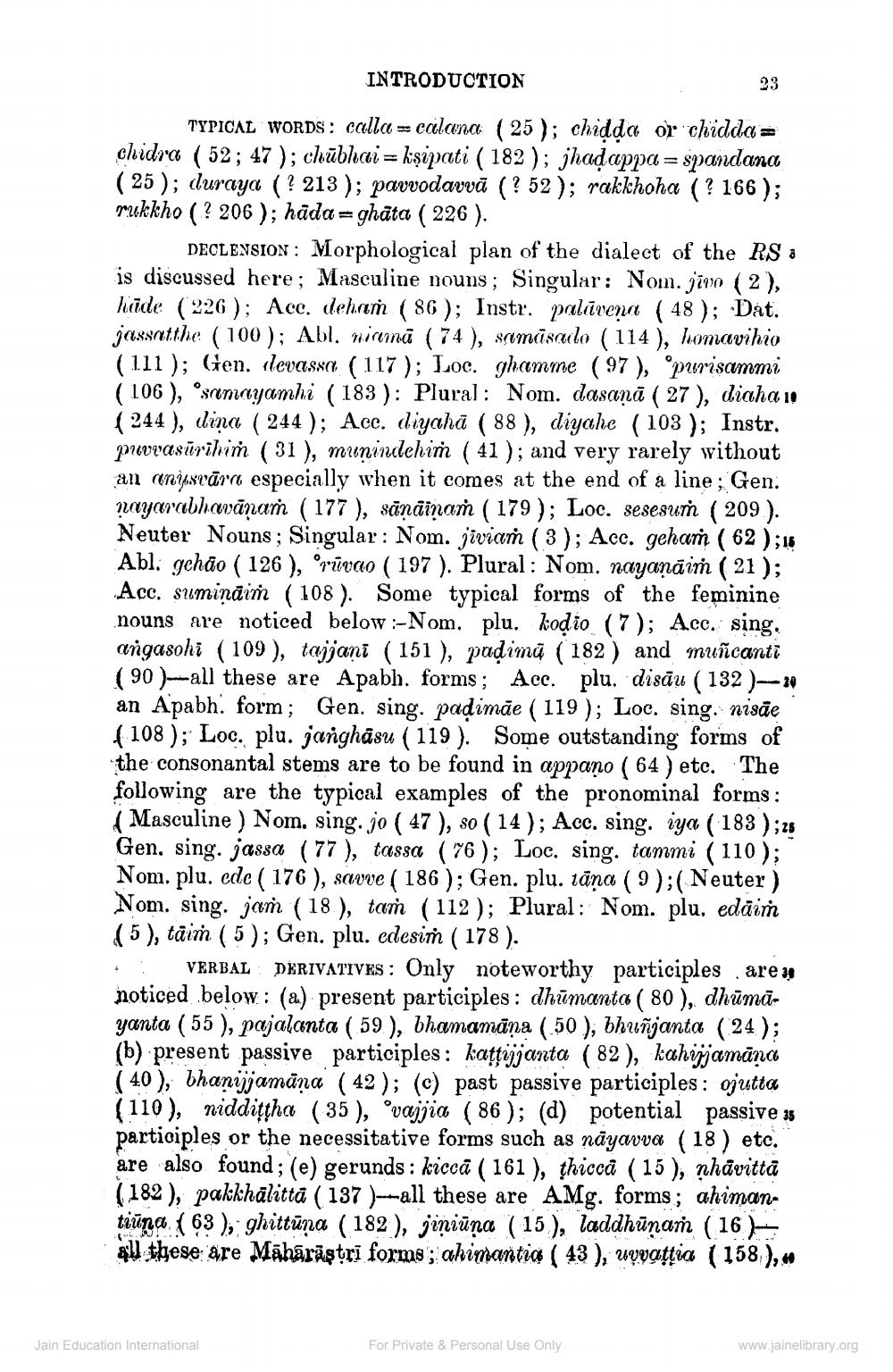________________
INTRODUCTION
23
TYPICAL WORDS: calla = calana ( 25 ); chidda or chidda = chidra (52; 47 ); chūbhai = kşipati ( 182 ); jhadappa = spandana ( 25 ); duraya (? 213); pavvodavvă (? 52); rakkhoha (? 166 ); rukkho ( ? 206 ); häda=ghāta ( 226 ).
DECLENSION : Morphological plan of the dialect of the RS : is discussed here; Masculine nouns; Singular: Nom. jivo (2), hüde ( 226 ); Acc. deham ( 86 ); Instr. palūvena ( 48 ); Dat. jassatthe (100); Abl. nirmā ( 74 ), samasaulo (114), homavihio (111); Gen. olevassa (117); Loc. ghamme ( 97 ), 'purisammi ( 106 ), osamnyamhi (183): Plural: Nom. dasaņā ( 27 ), diaha 10 ( 244 ), dina ( 244 ); Acc. diyahā ( 88 ), diyahe ( 103 ); Instr. puvasūrihin ( 31 ), munindehiṁ ( 41 ); and very rarely without an anjsvārni especially when it comes at the end of a line; Gen. rayarabhavānam ( 177 ), sāņāinaṁ ( 179 ); Loc. sesesuṁ ( 209 ). Neuter Nouns ; Singular : Nom. jivian ( 3 ); Acc. gehan ( 62 ); 16 Abl. gehão ( 126 ), 'rūvao ( 197 ). Plural: Nom. nayaņāim ( 21 ); Acc. sumiņāin ( 108 ). Some typical forms of the feminine nouns are noticed below :-Nom, plu. kodio (7); Acc. sing. angasohi (109), tajjani ( 151 ), paờimă ( 182 ) and muñcanti ( 90 ).-all these are Apabh. forms; Acc. plu. disāu ( 132 )--10 an Apabh. form; Gen. sing. padimãe ( 119 ); Loc. sing. nisãe (108); Loc. plu. janghāsu (119). Some outstanding forms of the consonantal stems are to be found in appaņo ( 64 ) etc. The following are the typical examples of the pronominal forms: ( Masculine ) Nom. sing. jo ( 47 ), so ( 14 ); Acc. sing. iya ( 183 ); 25 Gen. sing. jassa (77), tassa ( 76 ); Loc. sing. tammi (110); Nom. plu. cde ( 176 ), savve ( 186 ); Gen. plu. lāņa ( 9 );( Neuter) Nom. sing. jam (18), taṁ (112); Plural: Nom. plu, edāim (5), taiṁ ( 5 ); Gen. plu. cdesiṁ ( 178 ).
VERBAL DERIVATIVES : Only noteworthy participles are: noticed below: (a) present participles : dhūmanta ( 80 ), dhūmāyanta ( 55 ), pajalanta ( 59 ), bhamamāņa ( 50 ); bhuñjanta (24); (b) present passive participles: kațțijjanta ( 82 ), kahijjamāna ( 40 ), bhanijjamāna ( 42 ); (c) past passive participles: ojutta (110), niddițyha (35), ovajjia ( 86 ); (d) potential passive as participles or the necessitative forms such as nāyavva (18) etc. are also found; (e) gerunds: kicca ( 161 ), thicca (15), nhävitta ( 182 ), pakkhālitta ( 137 )--all these are AMg. forms; ahimantiūna. ( 63 ), ghittūna ( 182 ), jiniūņa (15), laddhūnam (16) & these are Maharastrī forms; ahimantia ( 43 ), upvattia ( 158 ),
Jain Education International
For Private & Personal Use Only
www.jainelibrary.org




